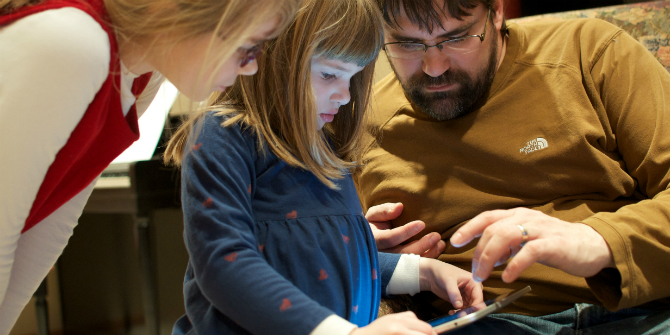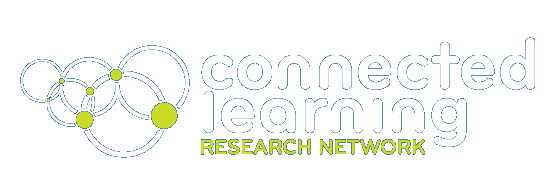Parents Are Now ‘Digital Natives’ Too – Thoughts from the 2015 Family Online Safety Institute Conference
January 1, 2016
PROJECTS: Preparing for a Digital Future
TAGS: Digital Natives
Last week, we shared a range of insights from our Parenting for a Digital Future project at the 2015 Family Online Safety Institute Conference, which focused on the many benefits, opportunities, and challenges our online lives can offer. Alicia Blum-Ross reflects on the mixed messages that industry and research often provide to parents, as they are now increasingly ‘digital natives‘ themselves. She finds that monitoring and protection are important aspects of digital parenting, but so are fun and enjoyment, too. Alicia is a researcher at the LSE’s Department of Media and Communications. She is interested in youth media production and is part of the Parenting for a Digital Future research project.
Advice for parents, and products marketed to them, is not hard to come by. From guidelines on digital parenting from those working to support parents to for-profit companies trying to find an audience for a new app or gadget, parents present a lucrative financial market, and an audience anxious for good ideas. The advice is, at least in theory, generally informed by research. The commercial side is more variable.
There are moments when advice-givers (regulators, NGOs, government, parenting experts), content providers and researchers are in synch. For example, at the recent Family Online Safety Institute conference (FOSI) spoke with someone from TheSmartTalk.org. This free website gives parents and children a platform on which they can jointly create an interactive family media contract with up to date options covering new kinds of technology. Parents and children can together discuss their family values and practices around media, with the website as a prompt, and come up with suggestions for appropriate use (that covers parents too!). It’s not strictly necessary to have a website for this, but this type of conversation is something we’ve also recommended based on our research, and a fun website can’t hurt.

Credit: T. Wilson, CC BY 2.0
But there are other times where it feels like the marketing and the advice to parents are wildly out-of-step. Obvious examples include the growth of ‘smart’ toys, while simultaneously families worry about digital data being collected about their child(ren) and the lack of clarity about what these devices collect or store. I would have said that another was the baby bouncer with the tablet attached but that’s (thankfully) been taken off the market. Many parents are unconcerned about this dissonance, doing and buying what feels easiest, but others are flummoxed by the mixed messages.
FOSI does an admirable job balancing the multiple and competing rhetoric of risk vs. opportunity or of safety vs. creativity. This is supported by their on-going research (most recent report here) into the digital lives of families, which shows that while the worries are real, the picture is generally less dire than is reported in the mainstream press. Yet the advice from some of the ‘parenting experts’ at the conference seemed to miss some of this nuance. The session specifically on digital parenting seemed almost comically focused on the dangers of exploitation and alienation online, and how to protect your child rather than enjoy, explore or learn with them.
In presenting our current research on parenting and technology Sonia noted that parents are, increasingly, ‘digital natives’ themselves. Confident users of technology, they access the digital world in their own lives for work, to keep in touch with friends, to find communities of support, to play games and enjoy. So there is again a strange disconnect between the advice given to these parents (to be wary, to be vigilant) and the products available to them. Many of the safety apps marketed to parents of school-aged children, to say nothing of the baby monitoring and tracking ones, presume a level of tech-savvy and comfort on the part of the parents. To use these apps you need to a) have the digital skills to access them and b) believe that apps and devices bring something useful and productive to your life in the first place. If you believe this why shouldn’t your child?
The jury is out for me about whether parenting apps are useful in and of themselves. I’ve used some and found others superfluous, like any variety of technology. But given that parents seem to be able to use these for safety and monitoring couldn’t there be a more positive address too? The parenting panel still seemed to present ‘good parenting’ as ‘special time’ (in the words of one presenter) ‘playing football and going bike riding’ as opposed to enjoying digital technologies together. Not that playing football is a bad thing of course, but a rousing shared game of FIFA or Madden (depending on which kind of football you mean), as part of a wide array of activities, can also foster family closeness. Yet many parents we’ve interviewed instead guiltily characterize playing video games or watching films in your pyjamas as ‘lazy parenting.’
A recent article in the Atlantic used survey research to demonstrate that parents who acted as ‘mentors’ – by talking with their kids about technology, playing together, researching opportunities – had kids who were far less likely to post negative things online than ‘limiters’ who mainly emphasized time, physical or content restrictions. The panics about technology are as old as they are responsive to new developments. It strikes me that some advice-givers, in some cases self-confessed ‘luddites,’ need to pivot, and soon. Experts need to offer a positive vision to the rising generation of technologically empowered parents and we work hard for our Parenting for a Digital Future project to make a meaningful contribution to this effort. If commercial providers will fill this space, parents are left to fend for themselves. Digital parenting need not be solely about monitoring and protection, it can be about fun and enjoyment, too.


